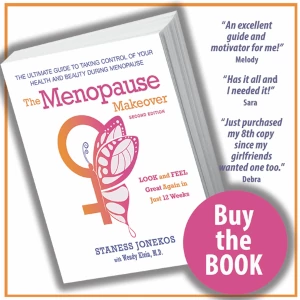IN THE MOOD FOR LOVE IN CINCINNATI
Dear Crabby,
My doctor has informed me that I am in perimenopause. My children are grown and it would be a relief if I no longer had to worry about birth control. I have used a diaphragm most of my adult life with great success, but it is inconvenient and kills “the mood”. In addition, my periods have been irregular. Do I still need to use birth control?
IN THE MOOD FOR LOVE IN CINCINNATI
DEAR IN THE MOOD:
The good news is you are “in the mood”. Many women experiencing perimenopausal symptoms lose their interest in sex. If your only concern is birth control-lucky you!
One of the benefits of menopause or post menopause is not worrying about birth control.
First, let’s define the three stages of menopause:
Perimenopause begins about 6-8 years before you reach menopause. During this time the levels of hormones produced by your ovaries start to fluctuate leading to irregular menstrual patterns; such as, irregularity in the length of the period, the time between periods, and the level of flow. At this time you are ovulating on and off, so you could become pregnant. Other common perimenopause symptoms are: hot flashes, night sweats, mood swings, vaginal dryness, weight gain, fluctuations in sexual desire, fuzzy thinking, trouble sleeping, fatigue and depression.
You are officially in menopause when you haven’t had a period for 12 consecutive months. At this point there are no more eggs left for your ovaries to release and pregnancy is impossible.
Post-Menopause is the period of life after you have reached menopause.
Since you are perimenopausal and still having periods it is advisable to continue practicing birth control because your ovaries have not completely stopped producing hormones. You may still ovulate and could become pregnant.
When your ovaries start producing lower levels of hormones you begin to experience symptoms associated with perimenopause. Irregular periods can be the first symptom you notice. Because your natural cycle is changing, some months you may ovulate and some months you may not. Menopause happens when the ovaries stop making enough hormones to stimulate your monthly cycle then your periods stop permanently. Only then can you stop worrying birth control. It is advisable you get confirmation from your doctor.
Since using a diaphragm for birth control can be inconvenient, and “kill the mood”, you may wish to consider one of these other methods of birth control.
Top five most popular forms of birth control
-Birth control pill, 96-99% effective. Using “the pill” is not only effective at birth control (diaphragms are only 85-90% effective) but the pill can help with perimenopausal symptoms. You may wish to discuss this option with your doctor.
-Condoms, 90-95% effective.
-Vasectomy, 100% effective. Many couples opt for this option after they have had their children.
-IUD (Intrauterine device) last six to ten years. This permanent device allows you to be “in the mood” without disrupting spontaneity.
-Norplant, a chemical contraceptive, is a match-sized rod that is inserted into the woman’s arm. It is time released into the woman’s system for up to five years.
Of course, abstinence is 100% full proof, but you signed your letter “in the mood,” so I’m sure that wouldn’t be an option. Continue practicing birth control until your doctor confirms that you are in menopause. If you have more than one partner, practice SAFE sex to avoid any sexually transmitted diseases.
Signed,
Less Crabby practicing birth control
Write to Dear Crabby and get advice about your menopausal symptoms.
If you have:
• Hot flashes
• Itchy skin
• Breast tenderness
• Mood swings
• Memory lapses
• Fuzzy thinking
• Night sweats
• Sleep problems
• Loss of libido
• Dry vagina
• Irregular periods
• Headaches
Dear Crabby has tips to make your life easier.
She wants to hear from YOU.
Send your questions to: DearCrabby@MenopauseMakeover.com
















